|
|
|
Sort Order |
|
|
|
Items / Page
|
|
|
|
|
|
|
| Srl | Item |
| 1 |
ID:
151298
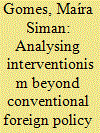

|
|
|
|
|
| Summary/Abstract |
Most of the analysis dealing with so-called “emerging powers” in the field of peace and security seek to explain the intentions and motivations (supposedly) behind these states’ foreign policy and changing normative positions. Several of those studies see foreign policy decisions as the result of rational processes, defined by a “means-and-ends” logic, essentially oriented by preconceived national interests, clear ideational precepts and fixed identities. Through a non-conventional analysis of the participation of Brazil in the United Nations Stabilization Mission in Haiti (MINUSTAH), the paper aims to advance an understanding of foreign policy as an identity practice that, especially in moments of domestic identity crisis, helps reinforce and stabilize specific representations of the state self and of those acting in its name. Informed by a post-positivist approach, the case discussed in the paper opens some avenues to explore how interventionism can be analysed beyond traditional foreign policy rationales and mainstream international relations theories.
|
|
|
|
|
|
|
|
|
|
|
|
|
|
|
|
| 2 |
ID:
190787
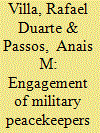

|
|
|
|
|
| Summary/Abstract |
Peacekeepers are seen as a UN tool for promoting domestic changes in host countries, but little is known about the political consequences when officers return home. During the last 10 years, Brazilian presidents appointed a significant number of former peacekeepers to key political functions. How and why do former peacekeepers end up so involved in government affairs? To answer this question, this paper focuses on the array of skills acquired by peacekeepers in domestic missions and reinforced abroad. Drawing on a set of semi-structured interviews and questionnaires to military, former political decision-makers, and researchers, as well as other primary and secondary sources, this paper details how political articulation, experience in conflict management, and prestige empowered Brazilian military officers to resume their tradition of intervention in politics. This paper also shows that peace operations can produce deleterious outcomes for troop-contributing countries in the Global South.
|
|
|
|
|
|
|
|
|
|
|
|
|
|
|
|
| 3 |
ID:
134390
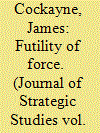

|
|
|
|
|
| Summary/Abstract |
Confronted by non-conventional non-state military forces enjoying high – but very localized – social legitimacy, the United Nations Mission in Haiti (MINUSTAH) struggled between 2004 and 2007 to embed the use of force in a larger strategy of state consolidation. The article explores the confrontations between MINUSTAH and unconventional armed groups in Haiti during this period. It traces MINUSTAH’s operations against criminal gangs, and the resulting process of strategic learning. It explores how tactical innovations allowed MINUSTAH to defeat the gangs, but also highlights that the larger political objective – breaking the connection between the gangs and Haiti’s political-business elite – remained unarticulated and elusive – and perhaps ultimately unfeasible, given the necessity of Haitian state consent for continued UN operations in the country. In a final post-script the article reflects on the return of the gangs after the earthquake of 12 January 2010, and what it signals about the limited impact of tactical force on the presence and power of political-criminal networks.
|
|
|
|
|
|
|
|
|
|
|
|
|
|
|
|
| 4 |
ID:
185886
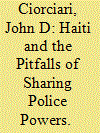

|
|
|
|
|
| Summary/Abstract |
This article examines the benefits and pitfalls of international policing in Haiti over the past quarter century. It shows the importance of the political foundations for joint policing arrangements. Haiti's experience illustrates that international personnel can provide useful stopgap policing services when the interests of national and international partners converge around public order crises. However, the Haitian case also shows how weak political commitment on one or both sides can lead to vague mandates, poor cooperation in the field, weak police accountability, and stalled domestic reforms. These problems have undermined the performance of international personnel and the Haitian National Police, eroding public trust in both. Ultimately, international intervention has failed to yield a capable, trusted, and apolitical Haitian police force or a notably stronger rule of law. Haiti thus offers a cautionary tale for international policing.
|
|
|
|
|
|
|
|
|
|
|
|
|
|
|
|
| 5 |
ID:
165115
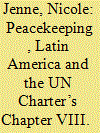

|
|
|
|
|
| Summary/Abstract |
Authorities at the United Nations have repeatedly called on regional organizations to step up their commitment in the area of peacekeeping. These calls are based on Chapter VIII of the UN Charter, which gives regional organizations a role in international peace and security. While organizations in Europe and Africa have created regional peacekeeping arrangements, such have failed to emerge in Latin America. This is puzzling, for different reasons. On the one hand, several countries have recently sought to increase their peacekeeping profile. States have strong incentives to pool their resources, especially if they face budgetary constraints such as the developing countries of Latin America. On the other hand, peacekeeping might provide an answer to some of the security problems the region faces. This article provides an evaluation of how Latin America has responded to the global demand to develop regional peacekeeping capacities. I argue that cooperation in peacekeeping has mainly been the result of foreign policy considerations rather than a concern for peacekeeping per se. In light of past experiences of shallow institutionalization, the article concludes with a reflection on the future prospects for a Latin American peacekeeping framework.
|
|
|
|
|
|
|
|
|
|
|
|
|
|
|
|
| 6 |
ID:
099921
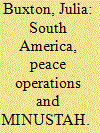

|
|
|
|
|
| Publication |
2010.
|
| Summary/Abstract |
This article explores the opposition to the UN Stabilization Mission in Haiti (MINUSTAH) articulated by the government of Venezuelan President Hugo Chavez Frias and the broader Bolivarian critique of militarized intervention and the liberal peacebuilding agenda. It argues that the structural drivers of South and Central America's embrace of peace operations were fundamentally absent in Venezuela, placing the country on the outside of regional peacekeeping initiatives building up to and including MINUSTAH. The article addresses Venezuelan efforts to craft an alternative peace and security agenda, concluding that there are significant fiscal and institutional challenges to this being realized.
|
|
|
|
|
|
|
|
|
|
|
|
|
|
|
|
| 7 |
ID:
114757


|
|
|
|
|
| Publication |
2012.
|
| Summary/Abstract |
From a post-colonial perspective, this article argues that the Mission des Nations Unies pour la stabilisation en Haiti (MINUSTAH) helps in our understanding of how the conventional peace operation model is, at the field-level, constantly challenged and renegotiated. Formally conceived as a francophone mission operating in a francophone country, MINUSTAH's deployment and interactions on the ground proved to be complex. Composed of a majority of Latin American troops, MINUSTAH has been exposed to symbolic and material pressures that range from the UN 'liberal peace model', French colonial heritage and previous US interference, to post-colonial worldviews and local demands. Benefitting from the combination of an academic approach and a practitioner's perspective this article demonstrates that although MINUSTAH was framed inside a specific UN mission pattern, grounded in a supposedly dominant francophone culture and located on the 'outskirts' of the United States, it has been subjected to a plurality of other pressures - such as demands from leading contributing countries - and opened to multiple re-articulations of its original mandate. This article politicizes the multiple encounters between a pre-defined peace operation model and everyday field realities.
|
|
|
|
|
|
|
|
|
|
|
|
|
|
|
|
|
|
|
|
|